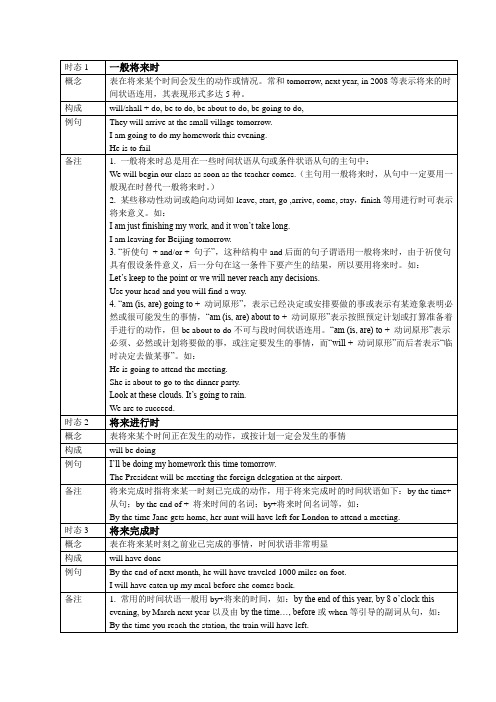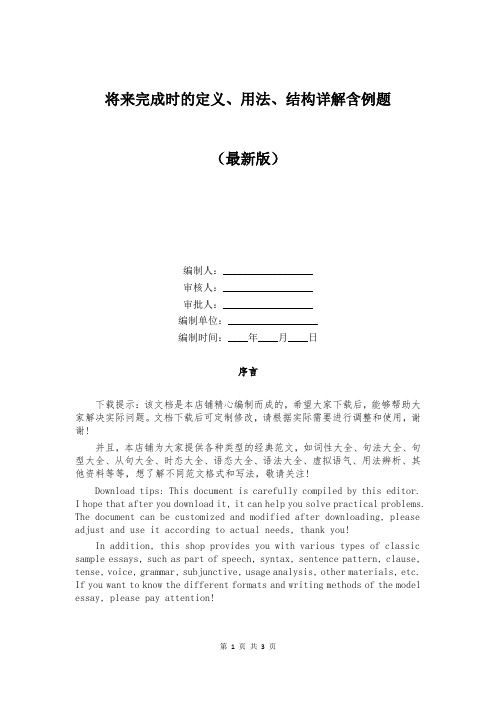时态详解:将来完成时
(完整版)一般将来完成时的用法详解

(完整版)一般将来完成时的用法详解一般将来完成时的用法详解
一般将来完成时是英语中的一种时态,用于表示将来某个时间点之前已经完成的动作或情况。
下面将详细介绍一般将来完成时的用法。
构成
一般将来完成时由将来时态的助动词 "will" 或 "shall"、"have" 和动词的过去分词构成。
肯定句结构:
主语 + will/shall + have + 过去分词
否定句结构:
主语 + will/shall + not + have + 过去分词
疑问句结构:
Will/Shall + 主语 + have + 过去分词 + 其他?
用法
一般将来完成时主要用于以下几种情况:
1. 表示将来某个时间点之前已经完成的动作或情况。
- I will have finished my homework by the time you arrive.
- By tomorrow, they will have already left for their trip.
2. 表示对未来某个时间点的预测。
3. 表示对过去某个时间点的未来完成的猜测。
- He will have passed the exam yesterday.
注意事项
1. 一般将来完成时通常用于将来时间点之前的动作或情况,因此在句子中应明确指出相关的时间点。
2. 一般将来完成时也可以与其他将来时态连用,如将来进行时、将来完成进行时等,以表达更复杂的时间关系和语义。
希望以上解释对您有所帮助。
如果您有任何疑问,请随时向我
提问。
过去完成时现在完成时将来完成时课件 高三英语语法

2. 过去完成时的用法:总的来说,过去完成时表示“过去的过去” ① 表示在过去某一时间或动作之前已经发生或完成了的动作。 The film had been on for 5minutes when I arrived at the cinema. I had finished my homework before I began to watch TV. ② 表示从过去某一时间开始,持续到过去另一时间的动作或状态。 Mr. Li had taught English for 8 years in China before he came to America.
10
单项选择
1. --Who will go to the station to meet Lorry?
--I will. I __B___ her several times.
A. met B. have met C. had met D. will meet
2. How long have you __D_____ here?
7
③ 用于一些固定句型,如hardly...when..., no sooner...than..., it was the first time that... Hardly had he seen me when he ran away. I had no sooner reached home than it began to rain. It was the first time this year that he hadn’t worked on a Saturday.
Unit 11 将来完成时,将来进行时与过去将来时,will have to

Summary:将来进行时
结构:
will be doing 意义: 用于谈论在将来某个特定的时间点正在进行 的动作,或表示将来某个时间段正在持续的动作。 一般用延续性动词。
例:1.下周这个时刻我正躺在沙滩上。
This time next week I’ll be lying on the beach.
Future Continuous 将来进行时
Discovery 2
his future time 将来某个特定的时间 tomorrow Then What We are what are having you will doing you our be English now? doing class. this time tomorrow? . We were playing football Then what were you doing this time yesterday? We will be having an English exam.
past
now
Discovery 2
Listen to Professor Willard
time
past now
at将来某个特定的时间 9 a.m. this Saturday
At 9 a.m. this Saturday I will be listening to Professor Willard.
3. be to do 表示计划或安排即将发生的动作。 表示约定、责任、命令、或注定要发生的动作。 官方计划或决定(常见于报纸或广播) He and I are to meet at the railway station tomorrow. 计划或安排 You are not to be back late. 责任,命令 if not watered, the plants are to die.注定要发生 的动作 the president is to speak on TV tonight.官方计划 或决定
一般将来时,将来进行时,将来完成时

1.I won’t be able to attend the meeting tonight because____then.A. I must have a classB. I will be teaching a classC. I teach a classD. I will have taught a class2. -----Could you give these books to Mr. Black?-----Absolutely, ___ him at five this afternoon.A. I will have a talk withB. I have a talk withC. I can have a talk withD. I will be having a talk with3. I’m afraid I won’t be available then. I ___ a friend at three this afternoon.A. seeB. am seeingC. will seeD. will be seeing4. Next Friday I will go to another concert. They ____ some thing by Mozart at that time.A. playB. will be playingC. are going to playD. are to play5. -----What are you doing, Jack?-----Make a model plane. I ____ it in the science class at 10 o’clock tomorrow morning.A. will be showingB. am going to showC. showD. have showed1. 下星期这时候我们将在那个工厂劳动。
将来完成时的定义、用法、结构详解含例题

将来完成时的定义、用法、结构详解含例题(最新版)编制人:__________________审核人:__________________审批人:__________________编制单位:__________________编制时间:____年____月____日序言下载提示:该文档是本店铺精心编制而成的,希望大家下载后,能够帮助大家解决实际问题。
文档下载后可定制修改,请根据实际需要进行调整和使用,谢谢!并且,本店铺为大家提供各种类型的经典范文,如词性大全、句法大全、句型大全、从句大全、时态大全、语态大全、语法大全、虚拟语气、用法辨析、其他资料等等,想了解不同范文格式和写法,敬请关注!Download tips: This document is carefully compiled by this editor.I hope that after you download it, it can help you solve practical problems. The document can be customized and modified after downloading, please adjust and use it according to actual needs, thank you!In addition, this shop provides you with various types of classic sample essays, such as part of speech, syntax, sentence pattern, clause, tense, voice, grammar, subjunctive, usage analysis, other materials, etc. If you want to know the different formats and writing methods of the model essay, please pay attention!将来完成时的定义、用法、结构详解含例题将来完成时表示从将来的某一时间开始,延续到另一个将来时间的动作或状态,或是发生在某个将来时间,但对其后的另一个将来时间有影响的动作或状态,它的句子结构是“will/shall have+动词的过去分词”,第一人称I、we用shall或will,其余人称都用will。
【英语】高三必备英语将来完成时技巧全解及练习题(含答案)及解析

【英语】高三必备英语将来完成时技巧全解及练习题(含答案)及解析一、单项选择将来完成时1.The train arrives in Liverpool at 10 p.m. tonight . The plane I would like to take fromthere_______by then.A.will leave B.would have left C.will have left D.has left【答案】C【解析】试题分析:考查时态。
本句中的关键词是then,根据上下文可知这里的then表示的是at 10 p.m. tonight这是一个将来的时间,by与完成时连用,故使用将来完成时的时态。
句意:火车在今天晚上10点到达利物浦,在那个时候我要乘的飞机将已经离开了。
故C正确。
考点:考查时态点评:连词by到…时为止;该词经常与完成时连用,如果后面是现在的时间,句中就使用现在完成时;如果后面是过去的时间,就使用过去完成时;如果后面是将来的时间,就使用将来完成时。
2.We__________three quarters of the book by the end of next semester.A.have been learning B.will have learntC.had learnt D.would have learned【答案】B【解析】【详解】考查将来完成时。
句意:到下学期末的时候,我们将学习这本书的四分之三。
根据by the end of next semester可知,时态用将来完成时,故选B。
3.China _______________a high-speed railway network covering almost all its cities with a population of of more than 500,000 by 2015.A.is setting up B.will set upC.has set up D.will have set up【答案】D【解析】试题分析:句意:中国在2015年为止将已经建成了覆盖所有城市超过50万人口的高铁网络。
将来完成时

将来完成时的分类将来完成时:1。
构成:shall / will have + 过去分词2.功能:表示将来某时之前已经完成的动作。
→They will have been here for 5 years next Friday.→By the end of next term, the students will have finished the book。
过去将来完成时:1。
构成:would / should have + 过去分词2.功能:表示从过去某个时间看将来某时之前已经完成的动作。
→He said that they would have arrived by seven o’clock。
将来完成进行时:1.构成:shall / will have been + 现在分词2.功能:表示某一动作将继续到将来某时,且该动作此时尚未发生。
→We shall have been staying here for four weeks when Tom arrives。
→It will have been raining for a week if it does not stop tomorrow。
[注:此句型过于复杂,人们很少运用,了解而已。
]将来完成时主要用法归纳1. 表示将来完成即表示到将来某个时间为止势必会完成或预计要完成的动作.如:Maybe by then you will have changed your mind。
也许到时候你已经改变主意了。
“You’ll have finished by tomorrow。
” “I wish!" “你到明天就完成了.”“但愿如此! "I hope I’ll have finished the work by the end of the month. 我希望我这个月底能完成工作。
Demand for cars in the developed world will have reached saturation point within 20 years。
将来完成时

知识点总结将来完成时的构成将来完成时的构成是由"shall/will + have +过去分词"构成的。
Before long he will have forgotten all about the matter.不久他就会全然忘记这件事的。
He is somebody now. He will not have remembered his old classmates.他现在是一个有身份的人了,他可能不会记得老同学了。
Will you have known Kevin for 10 years next month?到下个月你认识凯文该有10年了吧?将来完成时的用法①表示在将来某一时间之前已完成的动作,并往往对将来某一时间产生影响。
We shall have learned 12 units by the end of this term.到这个学期末,我们将学完12个单元。
By the time you get home I will have cleaned the house from top to bottom.你到家之前我将把房子彻底打扫一遍。
②表示推测,相当于"must have done"结构。
You will have heard of this, I guess.我想你已经听说过这件事了。
I am sure he will have got the information.我相信他一定得到了这个信息。
常用的时间状语by the end of +将来时间,by then, by the time+表将来时间的句子注意:在时间状语从句中,不用将来完成时,要用现在完成时来代替。
When I have finished that, I shall have done all I am supposed to do.等我做完这件事时,我就做完我该做的所有的事了。
- 1、下载文档前请自行甄别文档内容的完整性,平台不提供额外的编辑、内容补充、找答案等附加服务。
- 2、"仅部分预览"的文档,不可在线预览部分如存在完整性等问题,可反馈申请退款(可完整预览的文档不适用该条件!)。
- 3、如文档侵犯您的权益,请联系客服反馈,我们会尽快为您处理(人工客服工作时间:9:00-18:30)。
时态详解:将来完成时
一、将来完成的构成
将来完成时的构成方法是“will have +过去分词”。
如:
Hopefully after three years at university I will have matured. 希望3年大学生活之后我能变成熟。
Only five short years later, your money will have grown by $94,000. 仅短短 5 年时间后,你的钱就会增多94,000 美元。
He will have been heartened by the telephone opinion poll published yesterday. 他会为昨天公布的电话民意调查结果感到鼓舞。
二、将来完成的用法
1. 表示“将来完成”
即表示到将来某个时间为止势必会完成或预计要完成的动作。
如:
When we get there, she’ll have gone to work.我们到那里时她会已上班去了。
I expect you will have changed your mind by tomorrow. 我预料到明天你就会改变主意了。
2. 表示“持续”
即表示某种状况将一直持续到说话人所提及的某一将来时间。
如:
We will have been married a year on June 25th. 到6月25日我们俩结婚就满1年了。
By this time next week, I will have been working for this company for 24 years. 到下星期此刻,我就已经为该公司干了24年了。
3. 表示“推测
即表示根据某情况作出的推测。
如:
That will hav e been Roland. He said he’d be back at 7.准是罗兰。
他说他7点钟回来。
There will have been a definite result before Friday. 星期五以前肯定会有结果。
三、现在完成时、过去完成时与将来完成的区别
1. 现在完成时以现在时间为参照点,表示在“现在”以前完成的动作或持续到“现在”的状态;
2. 过去完成时则以过去时间为参照点,表示在“过去”某一时间以前发生的动作或持续到“过去”某一时间的状态;
3.将来完成时则以将来时间为参照点,表示在“将来”某一时间为止已经完成的动作或持续到“将来”某一时间的状态。
请看例句:
He has finished writing his novel. 他已写完了他的小说。
He had finished writing his novel by the end of last year. 去年年底他就写完他的小说。
He will have finished writing his novel by the end of next year. 到明年年底他就会写完他的小说了。
与一般现在时代替一般将来时一样,在表示时间或者条件的状语从句,通常要用现在完成时来表示将来完成时,而不能直接使用将来完成时:
I will go with you when I have finished my work. 等我完成工作之后我就同你去。
若不强调动作的完成(且不至于引起歧义),有时也可用一般现在时:
I will go with you when I finish my work. 我完成工作后就同你去。
四、将来完成通常搭配的状语
1. 用作状语的介词短语
There will have been a definite result before Friday. 星期五以前将肯定会有结果。
By next Christmas we’ll have been here for eight years.到下一个圣诞节,我们在这儿就住了整8年了。
By now you will have guessed that I’m back in Ireland. 你现在应该已经猜出我回到了爱尔兰了。
By the end of next week, I will have been a teacher for 25 years. 到下周末,我当老师就有25年了。
We’d better wait till 14 December. David will have had his exam by then, so he’ll be able to enjoy himself.我们最好还是等到12月14日。
到那时大卫就考完试了,这样他就能够玩得痛快。
2. 用作状语的从句
If I don’t run, the train will have left.(如果我不跑,火车就会开走了。
If he turns it down, he will have lost the moral high ground to the president. 如果他拒绝的话,就会把精神上的优势输给总裁。
If you finish this job as well, you will have done far more than I expected. 假如你将这项工作干完的话,那你会干得比我预料的要多了。
If there was any scandal in that company, you can be sure that Bobby will have clocked it. 那家公司有任何丑闻,博比肯定会知道。
五、将来完成时典型考题(附详解)
1.By the time Jane gets home his aunt ______for London to attend a meeting.
A.will
leave
B.leaves
C.will have left
D.mind
分析:C。
时间状语从句中用一般现在时表示将来,by加将来时间与将来完成时连用。
又如:
By May I will have got a new car. 到5月我将已买到一辆新汽车。
The old currency will have been phased out by 2020. 旧币分阶段至2020年将全部禁止流通。
2.On her next birthday, Ann ______ married for twenty years.
A.is
B.has
been
C.will
be
D.will have been
分析:D。
表示到将来某时(her next birthday)为止势必会完成的情况,英语要用将来完成时,故选D。
又如:
Don’t worry. It’s a storm in a teacup. Everyone will have forgotten about it by tomorrow. 别担心,这不过是茶杯里掀风浪,到明天大家就都把这事给忘了。
If they succeed on Europe, then they will have reshaped the political and economic map of the world. 如果他们在欧洲获得成功,他们将会改变世界政治和经济格局。
3.—I hear that Jason is planning to buy a car.
—I know. By next month, he _______ enough for a used one.
A.will have
saved
B.will be saving
C.has
saved
D.saves
分析:A。
根据句中的by next month可知空格处应填将来时态,故可排除C和D;至于是选A还是B,则需根据句意来确定,由于前文已说“正准备买车”,说明存钱已经存够了,故不宜选B。
句意为:“我听说詹森计划要买一辆车。
”“我知道,到下个月,他积蓄的钱就够买一辆二手车了。
”。
